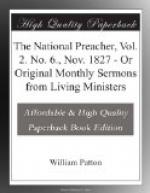Now suppose that all this influence of cities is of a worldly, immoral, irreligious character; what must be its blasting power on the general interests of religion! It was when the pretended successor of Peter established his authority in Rome, that that mystical Babylon became “the mother of harlots,” and “made the nations drunk with the wine of the wrath of her fornications.” And not until the angel shall “cry, with a mighty and strong voice, Babylon the great is fallen, is fallen,” will the strong man armed be vanquished, and the earth be encompassed with glory. Not until the evil influence of cities shall be arrested, will the mighty obstacles to the world’s redemption be removed. How immeasurably important then, that great efforts be made for their conversion; and how merciful in God to destroy such of them as will not repent. Oh, it was mercy infinite, that rained down fire upon Sodom, and poured it heavily upon Gomorrah; and thus saved millions from the contagion of their wickedness!
But suppose that all the influence of cities were of an heavenly character—suppose the intelligence could be circulated along all our navigable rivers and canals—suppose it could be communicated from village to village, and from family to family, throughout the country, that the Spirit of God, as on the day of Pentecost, had come down in awful majesty and power among us; that all our men of business, and youth of folly, had been arrested in their worldly career; that all our theatres and resorts for vain




